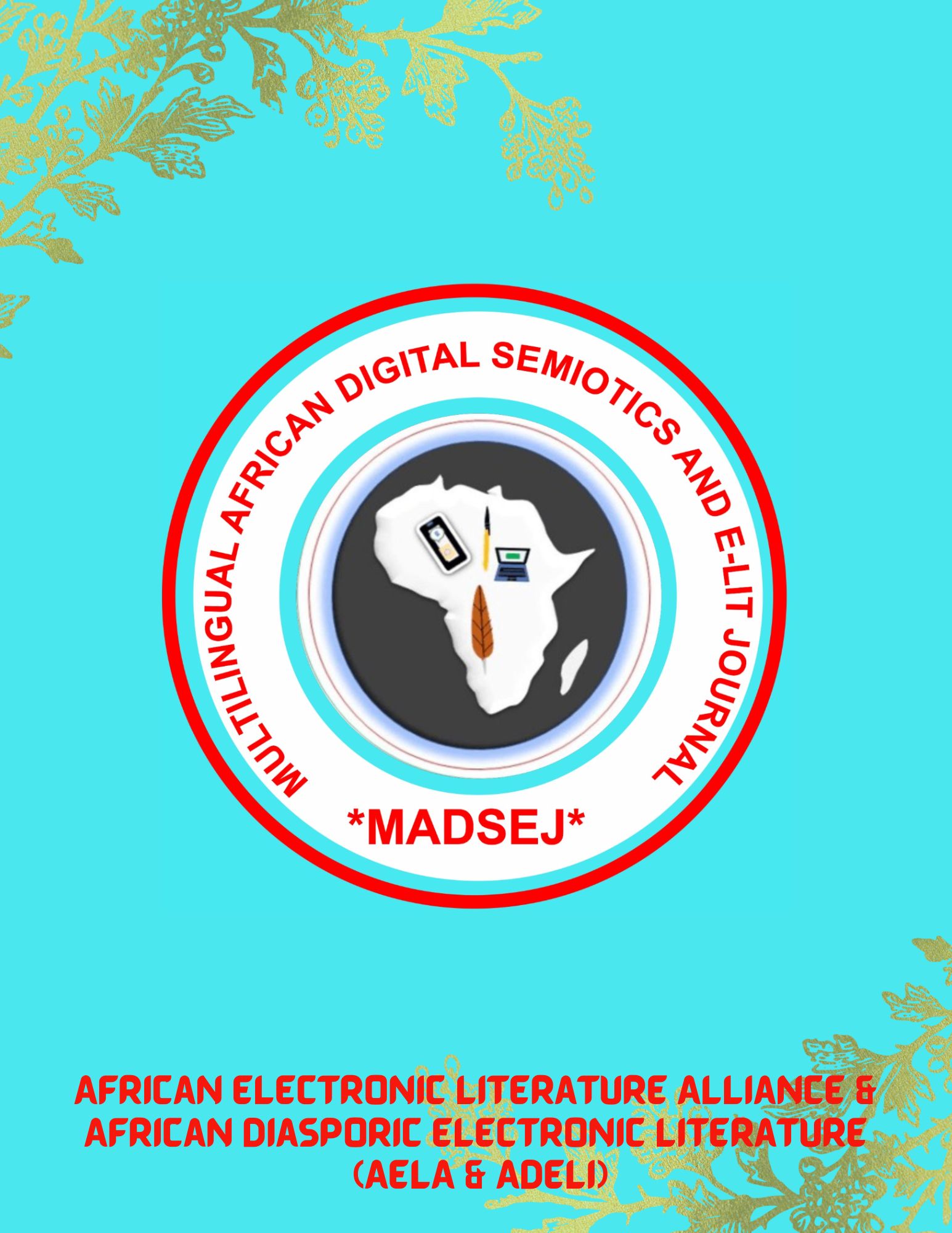Migration et littérature : une étude comparative de Chimamanda Ngozi Adichie et Ben Okri dans les humanités numériques
Mots-clés :
Miigration, Nigerian Diaspora, Chimamanda Ngozi Adichie, Ben Okri, Digital Humanities, Comparative literature, Data visualisationRésumé
Cette étude examine l’impact de la migration sur les calendriers de publication, les axes thématiques, les distinctions littéraires et les traductions des écrivains de la diaspora nigériane Chimamanda Ngozi Adichie et Ben Okri. En adoptant une approche mixte intégrant des analyses qualitatives et quantitatives, la recherche explore comment la migration influence leurs parcours littéraires et élargit la portée mondiale de la littérature nigériane. En utilisant des outils des humanités numériques tels que TimelineJS de KnightLab, Flourish et Google Sheets, l’étude visualise des données issues de sources fiables comme Amazon et Goodreads pour analyser les accomplissements internationaux de chaque auteur. Les résultats montrent que la migration façonne de manière significative les explorations thématiques d’Adichie et d’Okri, en abordant des questions complexes liées à l’identité, à la race et à l’appartenance culturelle. Cette recherche met en évidence la manière dont la visualisation numérique permet de mieux comprendre l’intersection entre migration et succès littéraire, illustrant comment ces auteurs naviguent et représentent les identités diasporiques. En fin de compte, l’étude apporte une contribution aux études littéraires africaines en soulignant le rôle de la migration dans le renforcement de l’influence mondiale et de la profondeur thématique de la littérature nigériane.
Téléchargements
Références
Achebe, Chinua. No Longer at Ease. Heinemann, 1960.
Achebe, Chinua. Things Fall Apart. Heinemann, 1958.
Adichie, Chimamanda Ngozi. Purple Hibiscus. Algonquin Books, 2003.
Adichie, Chimamanda Ngozi. Half of a Yellow Sun. Knopf, 2006.
Adichie, Chimamanda Ngozi. The Thing Around Your Neck. Knopf, 2009.
Adichie, Chimamanda Ngozi. Americanah. Knopf, 2013.
Adesanmi, Pius, and Charles Dunton. “The Politics of Postcolonial Modernity and the Shit of Nigerian Literature.” Research in African Literatures, vol. 39, no. 4, 2008, pp. 1-15.
Ajeluorou, Anote. “Atogun, Adebayo Task Local Publishers on Nigerian Writers.” The Guardian Nigeria News - Nigeria and World News, 10 June 2017, https://guardian.ng/art/atogun-adebayo-task-local-publishers-on-nigerian-writers/.
Awelewa, Abayomi. Adichie’s Half of a Yellow Sun. Leads African Studies Bulletin 78: LUCAS University of Leeds, 2016/2017, pp. 105-117, https://lucas.leeds.ac.uk/article/adichies-half-of-a-yellow-sun-abayomi-awelewa/.
Ayodeji, Ismail S. “Migration, Post-Colonial Diaspora and the Frontiers of Nigerian Literature in English.” HIRENTHA Journal of the Humanities, vol. 2, no. 1, 2016, pp. 71-92, https://www.researchgate.net/publication/349959381_Migration_Postcolonial_Diaspora_and_the_Frontiers_of_Nigerian_Literature_in_English.
Egbunike, Nkem. “The Been-To Paradigm in Early Nigerian Fiction.” Matatu: Journal for African Culture and Society, vol. 45, no. 1, 2014, pp. 217-234, https://brill.com/view/journals/mata/45/1/article-p217_14.xml.
Ezema, Izuchukwu. “75% of Books Published by Nigerian Companies Are Printed Abroad.” Vanguard, 10 May 2010, https://www.vanguardngr.com/2010/05/75-of-books-published-by-nigerian-companies-are-printed-abroad/.
Griswold, Wendy. “The Nigerian Novel.” Comparative Literature Studies, vol. 43, no. 4, 2006, pp. 522-532.
Hewett, Heather. “Adichie's Challenge to Achebe: Gender and Representation in Nigerian Literature.” African Literature Today, vol. 26, 2005, pp. 79-90.
Ibukun, Abiola Y. “Nigerian Authors Look West to Gain Their Fame.” Arab News, 26 Jan. 2012, https://www.arabnews.com/node/404913.
Okri, Ben. Flowers and Shadows. Longman, 1980.
Okri, Ben. The Famished Road. Jonathan Cape, 1991.
Opeibi, Timothy. “Digitizing the Humanities in an Emerging Space: An Exploratory Study of Digital Humanities Initiatives in Nigeria.” The Digital Black Atlantic, 2021, pp. 162-167, https://www.upress.umn.edu/9781517910808/the-digital-black-atlantic/.
Rapheal, Allwell. “Why We’re Pushing New African Stories Abroad.” The Sun Nigeria, 2020, https://sunnewsonline.com/allwell-uwazuruike-why-were-pushing-new-african-stories-abroad/. Accessed 19 Aug. 2024.
Rebekah, C. “History, Humour and Spirituality in Contemporary Nigeria: An Interview with Okey Ndibe.” Wasafiri, vol. 36, no. 1, 2021, pp. 25–31, https://doi.org/10.1080/02690055.2021.1838795.
Shercliff, Emma. “Nigerian Authors in the UK: Perspectives on Diaspora Literature.” African Studies Review, vol. 58, no. 3, 2015, pp. 9-15. https://brill.com/view/journals/logo/26/3/article-p51_8.xml
Sasu, Doris Dokua. “Nigeria - Migration Rate 2021.” Statista, 2023, https://www.statista.com/statistics/1233163/net-migration-rate-in-nigeria/.
Thomas, Abigail. “Transnationalism in Nigerian Literature: Mobility and Identity.” Journal of Postcolonial Writing, vol. 45, no. 3, 2009, pp. 230-242, https://doi.org/10.2307/217214.
DIGITAL TOOLS USED FOR DATA VISUALIZATION
1. Northwestern University Knight Lab- https://knightlab.northwestern.edu/
2. Daria Tunca’s Digital Corpus - Center for Teaching and Research in Post-colonial Studies (CEREP) University of Liège- http://www.cerep.ulg.ac.be/bibliographies/
John Henry’s Nig-ewriters Coprus https://nig-ewriters.rarebook-ubfc.fr/writers-journey/

Téléchargements
Publiée
Déclaration de disponibilité des données
Numéro
Rubrique
Catégories
Licence
(c) Copyright Henry Chukwudi John, Abayomi Awelewa 2024

Ce travail est disponible sous la licence Creative Commons Attribution 4.0 International .
-
Copyrights remain with the authors, who grant the journal the right of first publishing their submitted manuscripts. All materials published by MADSEJ is under an Attribution 4.0 International Creative Commons License which make them accessible to the public and to be shared since authorship and first publication credits are cited.
-
The Attribution 4.0 International (Creative Commons) allows the copy and redistribution of the material in any medium or format, as well as its adaptation for any purpose, even commercially.
-
Authors are permitted to give contract for non-exclusive distribution of the version of their works published in MADSEJ. For example, distribution in an institutional repository or as a book chapter but the authors should give credit to MADSEJ as the first to publish the manuscripts as well as acknowledge MADSEJ.





